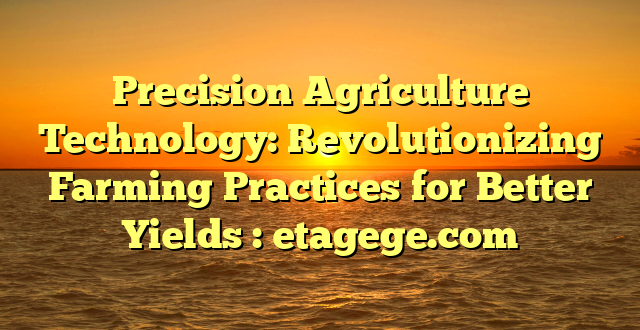Hello and welcome to our comprehensive guide on precision agriculture technology. In this article, we will explore the innovative ways farmers are using technology to optimize their crop yields and improve overall efficiency. Agriculture has come a long way since the days of plowing fields with a horse and plow. With the advent of precision agriculture, farmers can now use technology to monitor and manage every aspect of their crops, from planting to harvesting. Let’s dive in and discover the many advantages of precision agriculture technology.
What is Precision Agriculture Technology?
Precision agriculture technology refers to the use of advanced tools, systems, and equipment to optimize crop production and increase efficiency. By collecting and analyzing data on soil conditions, weather patterns, and crop growth, farmers can make more informed decisions about when and where to plant, fertilize, and harvest their crops. Precision agriculture technology includes a wide range of tools and techniques, from GPS-guided tractors to drones that can collect data on crop health and moisture levels.
The Benefits of Precision Agriculture Technology
There are many benefits to using precision agriculture technology. By optimizing crop production, farmers can reduce costs, increase yields, and improve overall efficiency. Here are just a few of the many advantages of precision agriculture:
| Advantages | Description |
|---|---|
| Increased Yields | By optimizing planting, fertilizing, and harvesting, farmers can increase their crop yields and produce more food with fewer resources. |
| Reduced Costs | Precision agriculture allows farmers to use resources more efficiently, reducing waste and lowering production costs. |
| Improved Efficiency | By analyzing data on soil conditions, weather patterns, and crop health, farmers can make more informed decisions about when and where to plant, fertilize, and harvest their crops, improving overall efficiency. |
| Environmental Benefits | Precision agriculture can help reduce the environmental impact of farming by reducing the use of pesticides and fertilizers, and minimizing soil erosion. |
As you can see, precision agriculture technology offers many benefits for farmers and the environment. Let’s take a closer look at some of the tools and techniques used in precision agriculture.
Tools and Techniques Used in Precision Agriculture
Precision agriculture technology relies on a wide range of tools and techniques to collect and analyze data on crop growth and soil conditions. Here are some of the most commonly used tools and techniques:
Global Positioning System (GPS)
GPS technology allows farmers to precisely track the location of their equipment and monitor crop growth. By using GPS-guided tractors, farmers can ensure that every inch of their fields is planted and fertilized evenly, reducing waste and improving yields. GPS technology can also be used to create detailed maps of soil conditions and crop growth, providing farmers with valuable data for making informed decisions.
Drones
Drones are increasingly being used in precision agriculture to collect data on crop health, moisture levels, and soil conditions. By flying over fields and taking high-resolution images, drones can provide farmers with detailed information on crop growth and identify areas that need attention. Drones can also be used to spray pesticides and fertilizers, reducing the need for human labor and minimizing the environmental impact of farming.
Data Analytics
Data analytics plays a critical role in precision agriculture, allowing farmers to make sense of the vast amounts of data collected on soil conditions, weather patterns, and crop growth. By analyzing this data, farmers can make more informed decisions about when and where to plant, fertilize, and harvest their crops. Data analytics can also be used to identify patterns and trends in crop growth, helping farmers make long-term decisions about crop rotation and other farming practices.
Automated Irrigation Systems
Automated irrigation systems allow farmers to precisely control the amount of water their crops receive, reducing waste and improving yields. By using sensors to monitor soil moisture levels, these systems can automatically adjust the amount of water delivered to each plant, ensuring that crops receive the right amount of water at the right time.
Precision Planting
Precision planting involves using advanced equipment to precisely place seeds in the soil, ensuring even germination and reducing waste. By using GPS-guided planters and other advanced equipment, farmers can optimize planting patterns and ensure that every seed has the best chance of growing into a healthy plant.
The Future of Precision Agriculture Technology
The use of precision agriculture technology is expected to continue to grow in the coming years, as farmers seek to improve efficiency and reduce costs. New technologies, such as machine learning and artificial intelligence, are expected to play an increasingly important role in precision agriculture, allowing farmers to make even more informed decisions about crop production.
Frequently Asked Questions (FAQs)
Q: What is precision agriculture technology?
A: Precision agriculture technology refers to the use of advanced tools, systems, and equipment to optimize crop production and increase efficiency.
Q: What are the benefits of precision agriculture technology?
A: Precision agriculture allows farmers to reduce costs, increase yields, and improve overall efficiency. It can also help reduce the environmental impact of farming.
Q: What tools and techniques are used in precision agriculture?
A: Precision agriculture relies on a wide range of tools and techniques, including GPS technology, drones, data analytics, automated irrigation systems, and precision planting.
Q: What is the future of precision agriculture technology?
A: The use of precision agriculture technology is expected to continue to grow in the coming years, with new technologies such as machine learning and artificial intelligence playing an increasingly important role.
Conclusion
Precision agriculture technology is revolutionizing the way farmers grow their crops, improving efficiency, reducing costs, and increasing yields. By using advanced tools and techniques to monitor and manage every aspect of crop production, farmers can make more informed decisions about when and where to plant, fertilize, and harvest their crops. With the continued development of new technologies, precision agriculture is expected to play an increasingly important role in feeding the world’s growing population.
